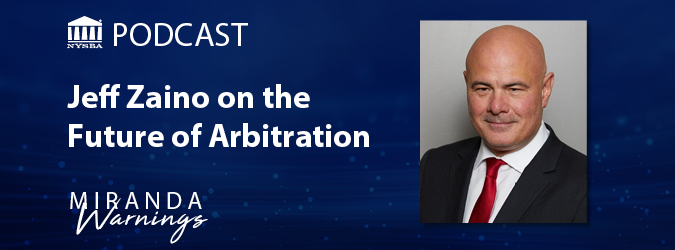Arbitration and Equal Justice Under the Law: A Double Victory
9.13.2023

While Coinbase Inc. v. Bielski has been hailed as a victory for arbitration, it should also be celebrated as no less a victory for equal justice under the law. This article will examine both victories, as well as suggest a way to ensure a uniform rule of law in the future.
The Arbitration Victory
Under Section 16(a) of the Federal Arbitration Act (FAA), when a district court denies a motion to compel arbitration, the unsuccessful movant may file an immediate interlocutory appeal. However, until the U.S. Supreme Court’s decision on June 23, 2023, in Coinbase, Inc. v. Bielski,[1] the U.S. Courts of Appeal were divided over whether filing an appeal automatically stays further proceedings in the district court pending appeal or whether a stay would be discretionary. The Third, Fourth, Seventh, 10th, 11th and D.C. Circuits have held that an appeal of a denial of a motion to compel arbitration automatically divests a district court of jurisdiction to proceed with the case pending the appeal. The minority rule, followed by the Second, Fifth and Ninth Circuits, is that a stay is discretionary. In Coinbase v. Bielski, the Supreme Court resolved the split by ruling a stay of proceedings is mandatory – a decision that may impact the selection of New York as a forum for international arbitration.
Coinbase v. Bielski involves two consolidated proposed class actions – filed by lead plaintiffs Abraham Bielski and David Suski – against cryptocurrency exchange platform Coinbase in federal district courts in California. The Bielski lawsuit alleges that Coinbase failed to appropriately respond to plaintiffs’ request for assistance after a scammer hacked into and stole money from their Coinbase accounts.[2] The unrelated Suski lawsuit alleges that Coinbase duped the plaintiffs into paying for entries in the company’s “Dogecoin sweepstakes.”[3]
In both cases, Coinbase moved to compel arbitration, relying on its user agreement that required plaintiffs to arbitrate their claims individually. Both motions to compel were denied. Coinbase appealed to the Ninth Circuit pursuant to Section 16(a) of the FAA, which expressly allows interlocutory appeals from orders denying motions to compel arbitration. The company also sought to stay the proceedings below while the appeals were pending. When the Ninth Circuit refused the stay, Coinbase sought Supreme Court review on the stay issue; the issue of arbitrability was not before the Supreme Court.
Coinbase argued that by expressly authorizing these one-sided interlocutory appeals, Congress recognized that the right to arbitrate is so crucial that the aggrieved party should be able to vindicate this right immediately with an interlocutory appeal. Thus, it argued that the statute itself created a pro-arbitration rule suggesting a mandatory stay.
The Equal Justice Victory
The Circuit Split
The circuit split dates back to the early 1990s when the Ninth Circuit became the first appellate court to address this issue in Britton v. Co-op Banking Group.[4] The Ninth Circuit held that the district court had discretion to either stay or proceed with the case while the interlocutory appeal of the denial of a motion to compel arbitration was pending, emphasizing that the plain language of the FAA did not require a stay. In 1998, the Seventh Circuit, in Bradford-Scott Data Corp v. Physician Computer Network, adopted the opposite position, holding that the FAA mandated a stay of district court proceedings.[5]
Since then, the Second and Fifth Circuits joined the Ninth Circuit in the minority position, holding that the FAA does not mandate a stay but instead applies the standard discretionary principles weighing: (1) the likelihood of success on the merits, (2) the prospect of irreparable injury absent a stay, (3) the balance of the equities and (4) the public interest.[6]
The Supreme Court’s decision is also significant because statistics show that reversals of district court decisions on whether to compel arbitration are more frequent than reversals in other appeals.[7] Comparing the reversal rates in the federal courts of appeals between 2012 and 2022, amici point out that the reversal rate for appeals challenging the denial of a motion to compel arbitration is roughly four times higher than the rate of reversal for private civil appeals (reversal rate of 43.6% for denials of motions to compel arbitration versus 12.3% for all private civil appeals). According to amici, this reversal rate reflects the district court’s continuing hostility to arbitration – a concern that Congress was aware of when it enacted Section16(a).[8]
The split in effect created a dual system of justice where litigants could obtain a stay, or not, based not on the merits of the case but what circuit court would hear the appeal. Given the number of denials of discretionary stays pending appeal and the high rate of reversal on appeal, litigants operating in the minority circuits were stripped of their rights under the FAA to select the rules governing adjudication of the dispute and deprived of the benefits of their arbitration agreement – imposing significant administrative burdens and costs that should have never been incurred. And this dual system of justice resulted in more than just monetary burdens. As amici pointed out, when a stay is denied, parties must follow the permissive procedures for discovery under the Federal Rules of Civil Procedure. Such extensive discovery disrupts business operations, with employees spending more time “responding to document requests and preparing and sitting for depositions.”[9] Often whoever drafted the arbitration clause probably did not consider whether a stay pending appeal would be the applicable law and how that might implicate the course of discovery and the attendant expenses associated with such decisions. Businesses in the country’s major commercial centers – notably, New York, Texas and California – were all operating under an inefficient and unfair rule (the Second, Fifth and Ninth Circuits all followed the minority rule).[10] In jurisdictions following the minority rule, litigants faced uncertainty on important threshold issues, such as whether the dispute was properly before an arbitrator. Instead of certainty and consistency, the protection of parties’ rights to arbitration was contingent on the chance occurrence of a district judge in a specific case being inclined to preserve those rights by granting a stay pending appeal. This dual system of justice turned the principle of equal justice under the law on its head.
After 30 Years, Finally a Resolution
In a majority opinion written by Justice Kavanaugh, the Supreme Court held that an automatic stay of proceedings in the district court was mandatory. Justice Jackson, in the dissent joined by Justices Sotomayor, Kagan and Thomas (in part), countered that the statute does not provide such relief, despite the fact that other statutes do, also opining that the case authority relied upon by the majority was insufficient to support their conclusion. The dissent suggests that the majority rule eliminating the trial court’s discretion impairs the ability of the district court to grant any injunction or other preliminary relief. The dissent notes that the mandatory general stay rule – without a clear basis articulated in the statute – perpetually favors one class of litigant-defendants seeking arbitration who can now press pause and leave plaintiffs to suffer losses of potential evidence while “bleed[ing] dry their patience and funding in the meantime.” But the opposite rule could impose enormous discovery and trial costs when a ruling in the interlocutory appeal might render that expense unnecessary. Such waste can harm putative class actions where companies incur significant expenses associated with class discovery, class certification briefing, and experts as they appeal the arbitration denial.
The majority opinion held that a district court must stay its proceedings while an interlocutory appeal on the question of arbitrability is ongoing, thereby reversing and remanding the case. Recognizing that Section 16(a) does not say whether the district court proceedings must be stayed, the court placed great reliance on a clear background principle prescribed by precedent including from Griggs v. Provident Consumer Discount Co.[11] The court noted that because the question on appeal is whether the case belongs in arbitration or instead in the district court, the entire case is essentially involved in the appeal. Justice Kavanaugh emphasized that adopting this rule reflects common sense and is supported by legal treatises such as Moore’s “Federal Practice Treatise” and Wright & Miller’s “Federal Practice and Procedure.” Additionally, the majority noted that from a judiciary-institutional perspective, allowing a case to proceed simultaneously in both the district court and courts of appeal creates the possibility that the district court will waste scarce judicial resources – which could be devoted to other pressing criminal or civil matters – on a dispute that will ultimately head to arbitration in any event. In contrast, the dissent recognized that by adopting such a position, the majority embraced a position that favors defendants seeking to enforce arbitration, providing a level of certainty to companies that expenses associated with extensive discovery in the district court can be placed on hold while the appellate court considers arbitrability.
Implications for International Arbitration and Increasing Use of New York as a Forum
In the context of international arbitration, certainty over whether users will have access to an arbitration forum is critical. The implications for international arbitration are significant because New York is one of the leading centers for international arbitration.[12] Simply resolving the circuit split restores some certainty, which aids arbitration.[13] Justice Kavanaugh articulated Coinbase’s concern on this point at oral argument.[14] The confidentiality assured by arbitration cannot be adequately protected once parties bring their dispute into a public forum. As Coinbase articulated at oral argument, “you can’t put the toothpaste back in the tube” once class discovery spills out into the public domain through litigation.[15]
On balance, the majority opinion in Coinbase supports the continued vitality of international arbitration in New York and the U.S. in general.
A Suggestion
Of course, the surest way to prevent future splits in the circuit courts is for Congress to write laws that are explicit in their intent, with no room for possible misinterpretation. But absent that, the courts should provide for a speedy path to Supreme Court review whenever there are signs of a pattern of bias in certain circuit court rulings. It took more than 30 years to resolve the split over a mandatory stay – and that’s just unacceptable.
Kayla Joyce graduated from Fordham Law School in 2023 and will be working at Holland & Knight in the litigation department later this fall. A version of this article appears in a recent issue of NY Dispute Resolution Lawyer, a publication of NYSBA’s Dispute Resolution Section. For more information, please see NYSBA.ORG/DRS.
[1] Coinbase Inc. v. Bielski, 143 S. Ct. 1915, 599 U.S. __ (2023)
[2] See Brief of Respondent Abraham Bielski at 5 (filed Feb. 1, 2023) [hereinafter Bielski Brief].
[3] See Brief of Respondents David Suski et al. at 9 (filed Feb. 21, 2023).
[4] 916 F.2d 1405 (9th Cir. 1990).
[5] 128 F.3d 504 (7th Cir. 1998).
[6] Nken v. Holder, 556 U.S. 418, 434 (2009).
[7] See Brief for the Chamber of Commerce and the NFIB Legal Center as Amicus Curiae Supporting Petitioner at 18-19 (filed Jan. 27, 2023).
[8] Id. at 20 (“Congress enacted Section 16(a) because it understood that trial courts might continue to display the hostility to arbitration that led Congress to enact the FAA in the first place. These sky-high reversal rates confirm Congress’s prescience, and they underscore the importance of the automatic stay in promoting the FAA’s principal objective in overcoming hostility to arbitration.”) (internal quotation and citation omitted).
[9] See Brief for the National Retail Federation as Amicus Curiae Supporting Petitioner at 13 (filed Jan. 27, 2023).
[10] See Brief for The Civil Justice Association of California as Amicus Curiae Supporting Petitioner at 3-4 (filed Jan. 27, 2023) (“[I]t is worth noting that the jurisdictions with the minority rule—the Second, Fifth, and Ninth Circuits—include the major financial and commercial centers in the United States (i.e., New York, Texas, and California). Businesses in these important jurisdictions should not have to labor under the existing inefficient and unfair rule. This Court should impose a consistent nationwide rule in favor of an automatic stay of trial level litigation while an appeal is pending from the denial of arbitration.”).
[11] Griggs v. Provident Consumer Discount Co., 459 U.S. 56, 58 (1982).
[12] See Jeffery Commission & Christiane Deniger, New York Holds Sway as a Preferred Arbitral Seat as Demand for International Arbitration Soars, N.Y. Law J., Mar. 18, 2022 (“As a global financial and commercial hub, New York meets the venue requirements of a variety of cross-border disputes with its neutral courts, well-developed body of complex commercial law, and deep bench of arbitrators, institutions, and lawyers. New York is the leading U.S. venue of AAA-IDCR arbitrations with 152 cases in 2020.”).
[13] See Brief for the National Retail Federation as Amicus Curiae Supporting Petitioner at 12 (filed Jan. 27, 2023) [hereinafter NRF Brief] (“A February 2022 survey of in-house lawyers at 400 Fortune 1000 companies found that, in 2021, spending on the defense of putative class actions . . . had crossed the $3 billion threshold for the first time and was also expected to continue its steep rise.”); Id. at 9 ( “One recent study of 100,000 cases in arbitration or federal court between 2011 and 2015 found that the increased speed of arbitration allowed the arbitrating parties to save $22.9 billion.”).
[14] See Transcript of Oral Argument at 66-67 (“[I]f the district court discovery goes forward . . . in a class action context, that is going to coerce massive settlements, and they don’t want to be coerced into massive settlements without having the opportunity to take advantage of the right that Congress has given them to have an appeals court decide whether arbitration is the appropriate.”).
[15] See Transcript of Oral Argument at 25 (“[H]uge harm results in the interim because discovery comes out, it spills out into the open, which is the very bargained-for thing that the arbitration agreement was all about. That toothpaste can’t later be put back in the tube.”).





